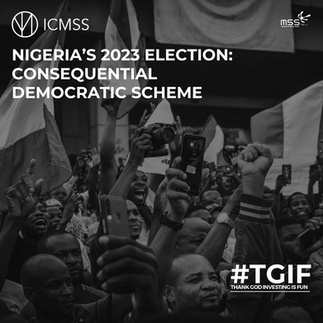Nigeria’s 2023 Election: Consequential Democratic Scheme
- ICMSS

- Feb 24, 2023
- 3 min read
Africa’s most populous country and largest economy, Nigeria, is currently holding its seventh national election after 24 years of continual democracy. For the first time since the collapse of the military regime in 1999, none of the candidates is an obligatory or a former military leader. The election will become the utmost democratic exercise on the continent as Nigeria will head to the polls on Saturday (2/25). In the run-up to the election, the country is currently dealing with a broad spectrum of economic and security issues, from record unemployment and inflation, a heavy debt burden, fuel shortage, deteriorating security conditions, and a falling local currency. With the unpredictable presidential election, Nigeria is currently experiencing unprecedented insecurity, leading to attacks on the Independent National Electoral Commission (INEC), such as the bombing of the electoral commission’s headquarters in Imo state last month. According to analysts, a record of 93.5 million Nigerians has registered to vote as they have shown a lot of disappointment and anger over outgoing President Muhammadu Buhari’s scattered legacy and term limits, which would force him to step down. Despite concerns due to the postponement of two previous elections, The head of Nigeria’s electoral commission, Mahmood Yakubu, insists there will be no disruptions and assured not to delay the 2023 general election.
Eighteen candidates are vying for Nigeria’s highest office and to succeed President Muhammadu Buhari, but only three are considered front-runners. One of the leading contenders is Bola Ahmed Tinubu, 70, the candidate of Buhari’s party, the All Progressives Congress (APC) – a former governor of Nigeria’s prosperous Lagos State with considerable influence in the southwest. Atiku Abubakar, 76, who served as vice president from 1999 to 2007, is one of Tinubu’s key rivals and is making a sixth attempt after losing his first five tries. He is a fervent capitalist who earned his fortune by investing in various industries in the country. Nigeria’s presidential elections have historically been two-horse races between the ruling and opposition parties, but this year’s election has a strong, credible alternative to the two major candidates, Peter Obi, 61, who is running under the lesser known Labour Party and is popular among young voters with his disruptive and decentralized campaign. The presidential election will be the “most unpredictable” since the transition to civilian administration, according to Leena Koni Hoffmann, associate fellow of the Africa Programme at Chatham House, who made the statement to CNBC on Monday (2/20). In order to ensure a free and fair election, The Independent National Electoral is rolling out unprecedented technological innovations which utilize fingerprint and facial recognition technology to lessen the possibility of fraudsters entering multiple votes.
Upcoming Nigeria’s presidential election affects most parts of the country. The downgrade of Africa’s largest economy was tied to the expectation that the government’s fiscal and debt position would continue to deteriorate. Depressed and uncertain oil production, capital outflows amid a flight to quality, and the government’s constrained access to external funding will likely continue to weigh on Nigeria’s external position in 2023. Implementation will probably take time due to substantial institutional and social constraints, according to Moody's Investors Service. The next presidency will presumably have to deal with an expanded trade area through the African Continental Free Trade Area (AfCFTA) and ensure that Nigeria's sizable population and industries are able to leverage, and are leveraged, to ensure the trade bloc's success. Similarly, Nigerian forces have been at the forefront of many peacekeeping deployments throughout the world – particularly in the region. These concerns would typically be on the agenda of the incoming president, but the negative implication of a contentious and divisive election will have not only consequences for Nigerians but the entire region. West Africa also needs a successful election to counter the prevailing setback of four attempted coups this year alone. The election feels like a showdown between an unstoppable force and an immovable object for Nigeria's future. Whoever triumphs, it feels like the beginning of a new era – in which Nigeria's enormous young population will no longer take a backseat.
Sources:
BBC
CNBC
Reuters
What would you like to learn next week? Comment, Like, and Share.







Comments